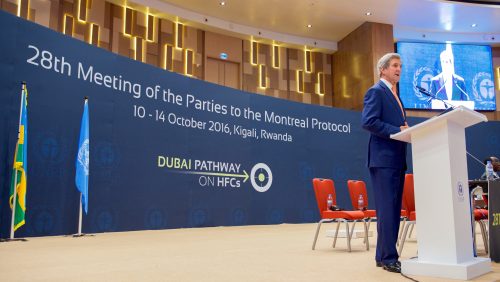The Kigali Amendment: Congress’s First Approved Climate Treaty in Decades
October 31, 2022 by Megan Algya

Then U.S. Secretary of State John Kerry advocates for the Kigali Amendment during the 28th meeting of the parties to the Montreal Protocol in 2016
On September 21, 2022, the Senate voted 69-27 to ratify the 2016 Kigali Amendment to the Montreal Protocol, marking the first climate treaty approved by the Senate in decades.[1] The Montreal Protocol is an international environmental agreement to phase out the “production and consumption of substances that deplete the ozone layer.”[2] The Kigali Amendment to the Montreal Protocol was adopted in 2016 and commits signatories to reduce their production and consumption of hydrofluorocarbons (HFCs) by more than eighty percent within the next thirty years.[3] HFCs are often found in air-conditioners and refrigerators and warm the planet roughly 1,000 times as effectively as carbon dioxide.[4] By reducing HFC emissions, the Kigali Amendment might prevent up to half of a degree Celsius in global temperature increases by the end of the century.[5]
Since 2016, 137 countries have ratified the amendment,[6] but the United States lagged in joining these countries during the Trump administration.[7] Even though the U.S. is just now signing on to the Kigali Amendment, Congress, President Biden, and even President Trump have already implemented policies to reduce the domestic use and production of HFCs by 85% in the next fifteen years.[8] These policies include the 2020 American Innovation and Manufacturing Act (AIM Act).[9] The AIM Act gave the EPA the authority to regulate HFCs and was modeled after regulations for other Montreal Protocol-governed chemicals.[10] The AIM Act essentially imposed the obligations of the Kigali Amendment on the U.S. before the Kigali Amendment was officially ratified.[11]
While Congress is typically divided regarding environmental and climate issues, the Kigali Amendment gained bipartisan support.[12] This was in part due to backing by business and industry in addition to environmental groups.[13] Business interests support the Kigali Amendment because moving away from HFCs is expected to stimulate investment in the United States and create jobs, and because U.S. manufacturers are ready to lead in the development, manufacturing, and exportation of refrigerants with a lesser climate impact.[14] Additionally, countries that fail to ratify the amendment by 2033 will have restricted access to international markets.[15] Joining the Kigali Amendment therefore enables American businesses to better compete.[16] Industry groups that support the amendment include the National Association of Manufacturers, the American Chemistry Council and the United States Chamber of Commerce.[17] This backing by business and industry made it easier for Democrats to secure Republican votes in ratification.[18]
Ratification of the Kigali Amendment is not the first time this year Congress acted to combat climate change. The 117th Congress also passed the Inflation Reduction Act (IRA) in August,[19] which was the largest spending bill on climate ever passed by Congress.[20] Unlike the Kigali Amendment ratification, the IRA received no support from Senate Republicans. The latter law narrowly passed after Vice President Kamala Harris broke a 50-50 tie.[21] These outcomes likely differed because the two bills were expected to have different impacts on business. Republicans were worried about inflation and the impact on the fossil fuel industry from the IRA,[22] but the Kigali Amendment does not regulate fossil fuels and, therefore, has “no downsides for businesses.”[23] Regardless of the difference in support for these two bills, Senator Chuck Schumer of New York, the majority leader, has called the Kigali Amendment ratification and IRA passage “the strongest one-two punch against climate change any Congress has ever taken.”[24]
[1] Lisa Friedman & Coral Davenport, Senate Ratifies Pact to Curb a Broad Category of Potent Greenhouse Gases, The New York Times (Sep. 21, 2022), https://perma.cc/ZW4J-6AK6.
[2] Montreal Protocol Marks a Milestone with First Ratification of Kigali Amendment, 51 Air Quality and Climate Change 14 (2017).
[3] Montreal Protocol Marks a Milestone with First Ratification of Kigali Amendment, supra note 2.
[4] Friedman, supra note 1.
[5] Friedman, supra note 1.
[6] Jean Chemnick, Why Republicans Support Kigali, ClimateWire (Sep. 21, 2022), https://perma.cc/L7C5-9ZK4.
[7] Nick Sobczyk, Senate Approves Climate Treaty After Years of Waiting, E&E News PM (Sep. 21, 2022), https://perma.cc/HB9L-R7WL.
[8] Friedman, supra note 1.
[9] Chemnick, supra note 6.
[10] Id.
[11] Sobczyk, supra note 7.
[12] Alex Guillén, Senate Approves First Climate Treaty in Decades, PoliticoPro (Sep. 21, 2022), https://perma.cc/8SWG-N6CF.
[13] Id.
[14] Id.; see Sobczyk, supra note 7.
[15] Friedman, supra note 1.
[16] Sobczyk, supra note 7.
[17] Chemnick, supra note 6; Friedman, supra note 1.
[18] Sobczyk, supra note 7.
[19] Id.
[20] Chemnick, supra note 6.
[21] Asha Glover, Biden Signs Landmark Tax and Climate Bill into Law, Law360 (Aug. 16, 2022), https://perma.cc/QD49-NWYN.
[22] Id.
[23] Chemnick, supra note 6.
[24] Friedman, supra note 1.

